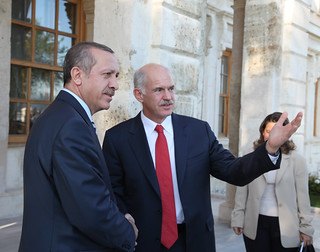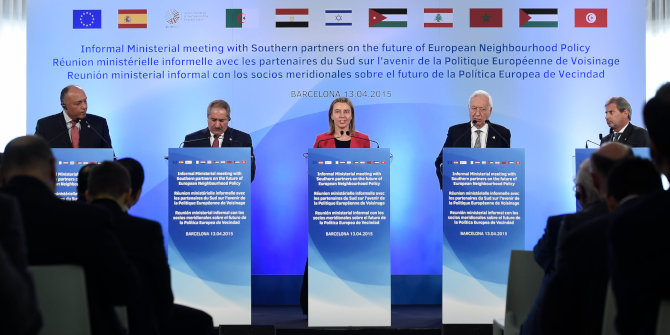 Greece’s financial crisis dominates its policy agenda. Meanwhile, the country’s foreign policy remains invisible. Melina Skouroliakou explores the status quo of Greek foreign policy, and calls upon political leaders not to forget the country’s relationship with Turkey and to reconsider its Balkan strategy.
Greece’s financial crisis dominates its policy agenda. Meanwhile, the country’s foreign policy remains invisible. Melina Skouroliakou explores the status quo of Greek foreign policy, and calls upon political leaders not to forget the country’s relationship with Turkey and to reconsider its Balkan strategy.
Foreign policy issues have not been high on the Greek policy agenda lately. Especially since the legislative elections of 2009, Greek foreign policy has been almost invisible as all eyes have been focused on the financial crisis, and accordingly, it was hardly an issue in the discourse of the political parties in their election campaigns. Moreover, since November 2011, Greece has been governed by a caretaker government headed by Lucas Papademos and it would have been nearly impossible for the outgoing Minister of Foreign Affairs to have engaged in any critical decisions concerning foreign policy issues.

There has also not been any substantial foreign policy event or change that could have had a major impact on Greek foreign policy goals or positions. Since NATO’s Bucharest Summit in 2008, in which Greece de facto vetoed FYROM’s membership to the organisation, Greek-FYROM relations and Greek-Turkish relations have essentially remained unchanged. Of course, Turkish Prime Minister Recep Tayyip Erdogan’s visit to Athens in May 2010 enhanced bilateral relations, but there was no progress in the issues dividing the two countries (territorial waters, airspace, continental shelf, demilitarisation of the Aegean islands).
So where does this leave Greek foreign policy today?
Major foreign policy issues concern on the one hand Greek-Turkish relations and on the other the name of and relations with FYROM. Essentially, no progress has been achieved in any of these areas for more than ten years. The last two years have been dominated by the financial crisis and that has had great influence on the exercise of foreign policy as it has deeply hurt the image of the country internationally and deprived it of possible bargaining chips. Greece has found it tough to take significant initiatives or plan ahead, not to mention the difficulty to negotiate on equal terms and achieve an important outcome in such an environment.
The Greek state needs to undergo a process of restructuring, which – if done properly – could eventually alter the function of the country. Such restructuring is needed for foreign policy as well, both in terms of structure and content. Foreign policy in Greece has been quite rigid and has often failed to evolve. The most pertinent example is migration. For more than two years, Greece has been the major entrance gate of clandestine migrants originated from Africa or Asia who pass through Istanbul and then from the Greek-Turkish boarders in Evros to the Schengen area, hoping to make their way to France, Italy, Germany or the United Kingdom. Although bilaterally raised, this issue has not been officially included in a Greek-Turkish foreign policy agenda. Moreover, having failed to give appropriate attention to the issue on time, Greece has belatedly requested for European assistance. Greece was slow in mobilising Europe to push for a collective approach to the problem, which is still not in place. Now, clandestine migration has developed to be a central issue in domestic politics, while in Europe, Greece has been finger pointed as the weak link of the Schengen Agreement.
Looking to the Balkans, Greece has put down an ‘Agenda 2014’ (coinciding with Greece’s EU rotating presidency), whose primary aim is to fix a specific date for full accession to the EU of those Western Balkan countries that will have, by then, fulfilled the membership criteria. As important as this might be, it needs to realistically consider the current and future European environment. Greece will most probably be still striving to recover financially, so most of its politics will still be focusing on the inside. Moreover, the EU itself goes through its own introversion phase and enlargement might stay out of its priorities in the medium-term: the Eurozone is still not stabilised and the debate is on regarding a new financial structure that would go beyond a mere monetary union. Europe will require time to digest any changes, before becoming ready to welcome any new members.
Greece needs to pay particular attention to economic diplomacy. Delimitating the Exclusive Economic Zones (EEZs) with its neighbour countries should remain a priority and become one of the central issues of foreign policy agenda. That will eventually help resolve some of the issues on the Greek-Turkish agenda as well. EEZs will redefine Greece’s relations with all its neighbours and create a new environment in South-Eastern Mediterranean. That includes Israel, with which Greece should continue to enhance its relations, following the recent rapprochement – under Georgios Papandreou’s government –and where much space for cooperation (energy, investments, tourism, security etc) exists.
Greek foreign policy is at a crossroads. Despite stagnation in the traditional issues of Greek foreign policy, new challenges are emerging. For years, there has been no consensus among the political parties to develop a common agenda that would be pursued independent of the change in government. That might be a challenge in this period of restructuring. But again, that is a different story.
Please read our comments policy before commenting.
Note: This article gives the views of the author, and not the position of EUROPP – European Politics and Policy, nor of the London School of Economics, nor of the Secretariat General of Information and Communication in Athens.
Shortened URL for this post: http://bit.ly/J2M10F
_________________________________________
About the author
 Melina Skouroliakou – Hellenic Observatory
Melina Skouroliakou – Hellenic Observatory
Melina Skouroliakou is a Press Officer at the Secretariat General of Information and Communication in Athens, currently at service at the Press Office in Paris. Prior to her appointment she was a Visiting Fellow at the Hellenic Observatory of the London School of Economics. Her research focuses on paradigms of Greek foreign policy.




Very interesting article and in to the point. Ms Skouroliakou seems to have a profound and very solid knowledge on the subject.
Excellent piece, Melina. Unfortunately, as so often happens the foreign policy issues that you point to will now become increasingly difficult to deal with owing to Greece’s preoccupation with its economic situation and its growing isolation from the European mainstream – whether in the Euro or out. The lesson here is that one needs to address tough issues when one enjoys a relatively positive situation.Trying to do so from a postion of weakness is a recipe for a mess, if not much worse.